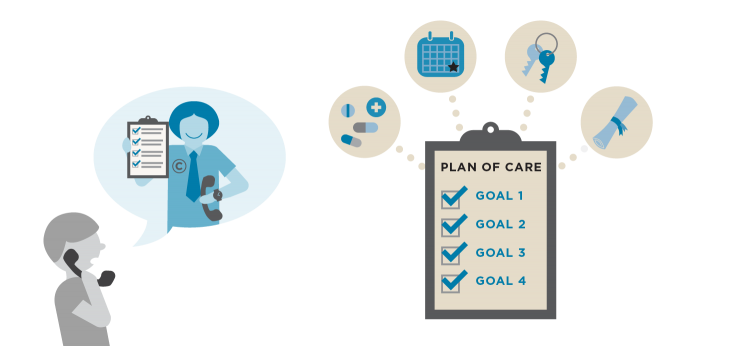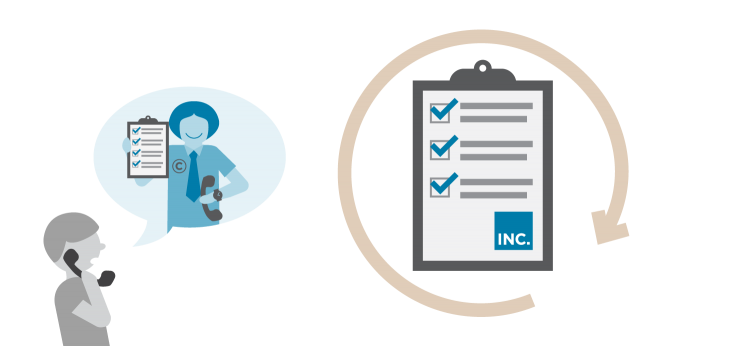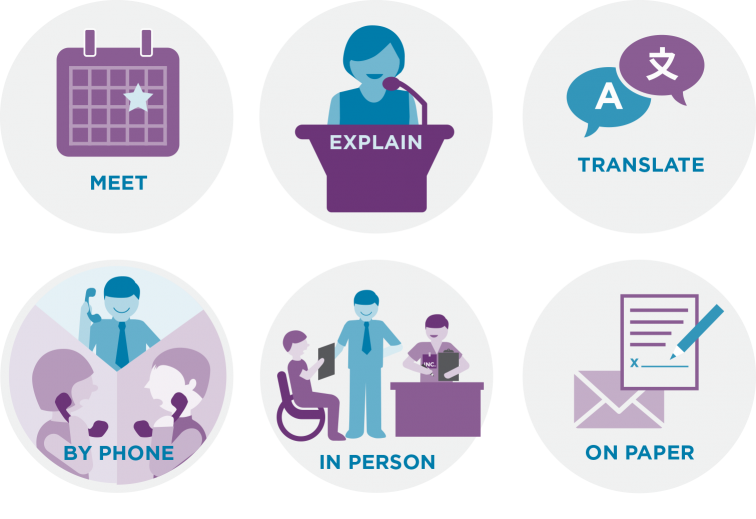This article is based on a brochure about HARP. You can read it online or download this printable version.
How to use this brochure
You can read this brochure from the beginning if you don’t know anything about New York’s Health and Recovery Plans (HARP).
You can also use the Table of Contents to skip straight to your question.
 If there’s anything you don’t understand or want more information about, you can always call ICAN at (844) 614-8800.
If there’s anything you don’t understand or want more information about, you can always call ICAN at (844) 614-8800.Table of Contents
What is a HARP?
Is HARP like what I have now?
How is HARP different from what I have now?
Who can join a HARP?
How do I join a HARP?
What happens after I join a HARP?
ICAN Can Help You
What is a HARP?
Mainstream Medicaid plans include medical care, mental health care, and treatment for substance use. HARPs cover those too, but they also give you care coordination and social services, to help you on your road to recovery.

HARP stands for Health and Recovery Plan.
A HARP is a new kind of health insurance for adults with serious mental health conditions or substance use disorders. HARP is a type of Medicaid plan that combines all of your medical care, including behavioral health care, into one plan. In a HARP, the focus is on you.
HARP covers all of the Medicaid benefits you have now, plus extra supportive services. These extra services can help you to stay healthy, go to school or work, and be part of the community. HARP is free, and will
not affect your other benefits like SSI, SSD, or SNAP.
Is HARP like what I have now?
Yes. HARP is for people who already have Medicaid through a Medicaid Managed Care plan (or MMC, sometimes called a “mainstream” Medicaid plan). MMC is a partnership between NY Medicaid and insurance companies. Medicaid pays these companies to provide Medicaid-covered care through their network of providers.
A HARP covers all of the same services and medical care you can get now through your MMC plan. This includes both medical care (doctors, hospitals, drugs) and behavioral healthcare (peer support, residential services, methadone maintenance, continuing day treatment).
If you join HARP, you may be able to keep the same health insurance company (most MMCs have HARPs too). But instead of being in their MMC plan, you’d be in their HARP plan.
Call the plan to make sure you can keep your current providers; most likely you can.
How is HARP different from what I have now?
There are two main services offered by HARP that aren’t offered by your regular MMC plan:
- Adult Behavioral Health (BH) Home and Community-Based Services
- Care Management
Adult Behavioral Health (BH) Home and Community-Based Services (Adult BH HCBS)
Adult Behavioral Health (BH) Home and Community-Based Services (Adult BH HCBS) are extra services that can help you meet your goals —like finding a job, returning to school, managing stress, and obtaining affordable housing.
Adult BH HCBS are only available for eligible members of HARPs and HIV Special Needs Plans (HIV-SNPs).
Your HARP might provide different Adult BH HCBS to you depending on your goals.
Here are some examples of different services available in HARP that might help you achieve different life goals.
Find Housing. Live Independently.
- Psychosocial Rehabilitation
- Community Psychiatric Support and Treatment
- Habilitation
- Non-Medical Transportation
Return to School. Find a Job.
- Education Support Services
- Pre-Vocational Services
- Transitional Employment
- Intensive Supported Employment
- Ongoing Supported Employment
Manage Stress. Prevent Crises.
- Short-Term Crisis Respite
- Intensive Crisis Respite
Get Help from People Who Have Been There.
- Peer Support Services
- Family Support and Training

Care Management
The other thing that makes HARPs special is Care Management. Once you enroll in HARP, your plan will assign you to a Health Home.
A Health Home is not a place you live; it’s an organization that helps you coordinate and manage your care. You will get a care manager who makes sure you get the all of the services, appointments, and medicines you need.
Your care manager will also help you make a Plan of Care based on your health care goals. The Plan of Care is a list of your goals and what Adult Behavioral Health (BH) Home and Community-Based Services (Adult BH HCBS) you may need to reach those goals. Even if you don’t need Adult BH HCBS or intensive care management now, being in a HARP makes it easier to get those services if you need them in the future.

Who can join a HARP?
To be eligible for a HARP, you must have Medicaid through a MMC plan, be identified by NY Medicaid, and have a mental health condition or substance use disorder.
You might already be in a HARP and not know it. NY Medicaid passively enrolled some people into HARPs.
If you don’t know if you are enrolled, you can call ICAN at 1-844-614-8800. ICAN is a network of non-profits that provides free, confidential help to people who are eligible for or enrolled in HARPs. You can also call New York Medicaid Choice, New York State’s Medicaid enrollment broker, at 855-789-4277.
If you are eligible for HARP, you should get a letter telling you how to enroll. The letter will tell you:
- About your choices for joining a HARP
- What to do next
- Where to get more information
Right now, HARPs are not for people who:
- Are not eligible for Medicaid;
- Have both Medicaid and Medicare;
- Live in a nursing home;
- Have services from the Office for People with Developmental Disabilities (OPWDD); or
- Are in a Managed Long Term Care Plan (MLTC Plan).
What if I’m not eligible for HARP?
The Medicaid program continually reviews its records to identify new people who might benefit from HARP. So even if you didn’t get a letter about HARP yet, you might in the future.
Some people can get the same HARP care coordination by enrolling in a Health Home. To qualify for a health home, you must either have two chronic health conditions, or have HIV/AIDS, or have a serious mental health illness.
You can contact ICAN for help getting care coordination or behavioral health services.
How do I join a HARP?
If you qualify, you should have been sent a letter with more information. But if you don’t have a letter, you can call New York Medicaid Choice to find out if you qualify. Counselors can help you in your language.
Call: 855-789-4277
Monday–Friday, from 8:30 am to 8:00 pm.
Saturday, from 10:00 am to 6:00 pm.
Enrollment in HARP
Once you receive the letter that you are eligible for HARP, you may be passively enrolled in a HARP, unless you opt out.
This means that about 30 days after the letter, NY Medicaid may enroll you in the HARP offered by the same insurance company as your current MMC plan.
If you decide that HARP is not right for you, you can call NY Medicaid Choice, New York State’s Medicaid enrollment broker, within the 30 days to opt out. If you do this you will keep all of the same coverage you have now, but you will not be able to get access to Adult BH HCBS.
If your current MMC plan does not offer a HARP, you will stay in your current plan, unless you choose a different one.
At this time, there is no way to actively apply for HARP. If you think you would benefit from a HARP but you have not received a letter from NY Medicaid, call ICAN for help at 844-614-8800.
What happens after I join a HARP?
Once you join, your HARP will continue to cover all of the services and providers you currently have for at least 90 days. After 90 days, if your current providers are not part of your new Plans’ network, you will have to work with your HARP and your provider to see what your options are.
If you change your mind about HARP after joining, you have 90 days (or 3 months) to disenroll and go back to a mainstream Medicaid plan like what you had before, or to choose a HARP offered by a different insurance company. After 90 days, you must stay in your HARP plan for 9 months, and then you will have a chance to change plans again.
How do I get Adult BH HCBS?
Once you enroll in HARP, your plan will assign you to a Health Home. Your care manager will contact you about setting up an assessment to help decide what Adult Behavioral Health (BH) Home and Community Based Services like job or peer support that you need. You get a new assessment for Adult BH HCBS once a year or after a major change in your life, such as a hospital admission or a loss of housing.
Your HARP must approve each step in the process. If you are having problems with the assessment or with your Plan of Care, call ICAN for help at 844-614-8800.

ICAN Can Help You
We can:
- Answer your questions about HARP.
- Tell you if you are already enrolled in a HARP.
- Help you communicate with your insurance company.
- Give you advice about your plan options.
- Help you keep the insurance you have now if you decide that HARP is not right for you.
- Identify and solve problems with your plan.
- Help you understand your rights.
- Help you file complaints and/or grievances if you are upset with a plan’s action.
- Help you appeal an action you disagree with.
Call 844-614-8800.
If you are hearing or speech impaired, you can use the NY Relay service by dialing 711.
Email ICAN@cssny.org.
ICAN can help.

Translations :
Planes de salud y recuperación (Health and Recovery Plans – Spanish)
Plans de Santé et de Rétablissement (Health and Recovery Plans – French)
Piani sanitari e riabilitativi (Health and Recovery Plans – Italian)
Plan Sante ak Rekiperasyon (Health and Recovery Plans – Haitian Creole)
Планы Health and Recovery (HARP) (Health and Recovery Plans – Russian)
Downloads :
- Health and Recovery Plans
- 健康与康复计划 (Health and Recovery Plans - Simplified Chinese)
- 健康與康復計劃 (Health and Recovery Plans - Traditional Chinese)
- Planes de salud y recuperación (Health and Recovery Plans - Spanish)
- Plans de Santé et de Rétablissement (Health and Recovery Plans - French)
- Piani sanitari e riabilitativi (Health and Recovery Plans - Italian)
- 건강 및 회복 (Health and Recovery Plans - Korean)
- Plan Sante ak Rekiperasyon (Health and Recovery Plans - Haitian Creole)
- Programy HARP (Health and Recovery Plans - Polish)
- Планы Health and Recovery (HARP) - (Health and Recovery Plans - Russian)